一般现在时,一般将来时 主将从现(精品文档)
初中易考知识点动词的时态和语态变化规则
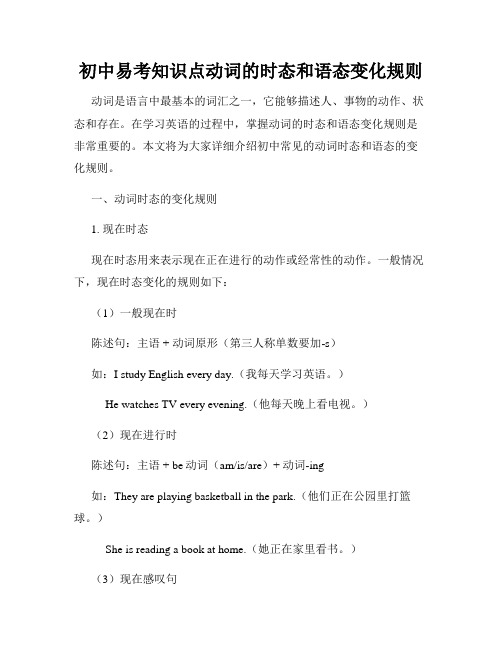
初中易考知识点动词的时态和语态变化规则动词是语言中最基本的词汇之一,它能够描述人、事物的动作、状态和存在。
在学习英语的过程中,掌握动词的时态和语态变化规则是非常重要的。
本文将为大家详细介绍初中常见的动词时态和语态的变化规则。
一、动词时态的变化规则1. 现在时态现在时态用来表示现在正在进行的动作或经常性的动作。
一般情况下,现在时态变化的规则如下:(1)一般现在时陈述句:主语 + 动词原形(第三人称单数要加-s)如:I study English every day.(我每天学习英语。
)He watches TV every evening.(他每天晚上看电视。
)(2)现在进行时陈述句:主语 + be动词(am/is/are)+ 动词-ing如:They are playing basketball in the park.(他们正在公园里打篮球。
)She is reading a book at home.(她正在家里看书。
)(3)现在感叹句助动词do/does + 主语 + 动词原形如:Do you like ice cream?(你喜欢冰淇淋吗?)Does he play the piano very well?(他弹钢琴弹得很好吗?)2. 过去时态过去时态用来表示在过去发生的动作或存在的状态。
一般情况下,过去时态变化的规则如下:(1)一般过去时陈述句:主语 + 动词过去式如:She studied hard last night.(她昨晚努力学习。
)They visited their grandparents yesterday.(他们昨天去看望了他们的祖父母。
)(2)过去进行时陈述句:主语 + was/were + 动词-ing如:He was playing basketball when I called him.(当我给他打电话时,他正在打篮球。
)We were watching a movie at that time.(那时我们正在看电影。
表示将来的时态(一般现在时表将来,现进表将来以及一般将来时)

一般现在时
在时间和条件状语从句中可用一般现在时代替
一般将来时。 I’ll let you know as soon as I hear from him. 我一接到他的信就告诉你。
现在进行时
有些动词,如come, go, leave, return, arrive,
begin, start等,它们的现在进行时可表示不远 的将来要发生的事情。例如: Flight 1095 is landing soon. 第1095号航班马上要着陆了。
Байду номын сангаас(
)5. Look! Some visitors __ for the bus over there. (2015南宁) A. are waiting B. is waiting C. waiting D. Wait
( (
) 6. ---What were you doing at 5:30 yesterday afternoon? --- I ______ with Sam.(2016 钦州) A. walk B. walks C. was walking D. walked )7. — What are you going to do tomorrow?(2014 柳州) — I ______ visit my aunt. A. went to B .go to C. am going to
一般将来时
一般将来时是表示从现在开始将来要发生的事。 肯定句构成: be going to do sth. will / shall do sth. 其中 will 可用于任何人称, 而 shall 只可以用于第一人称 三.否定句及一般疑问构成: 1. be going to do sth. 在be动词后面加not;一般疑问句将be动词 放在句首。 2. 2. will / shall do sth.否定结构在 will 后加 not, 缩写为 won’t ;一般疑问句将 will 提放句首。 四、常用的时间状语: tomorrow, next week, soon, in the future, in two days等等。
2024年初中英语知识点主动语态的16个时态详解

一、一般现在时(Simple Present Tense)一般现在时表示经常性、习惯性或普通的动作或存在的状态。
用于表示日常生活、客观事实、科学真理、历史事件等。
结构:主语+动词原形(第三人称单数在动词原形后加-s)例句:He plays basketball every day.(他每天打篮球。
)二、一般过去时(Simple Past Tense)一般过去时表示过去一些时间发生的动作或存在的状态。
用于谈论完成的动作、过去的习惯、过去的经历等。
结构:主语+一般过去时(动词过去式形式)例句:They visited the Great Wall last summer.(他们去年夏天参观了长城。
)三、一般将来时(Simple Future Tense)一般将来时表示将来一些时间将要发生的动作或存在的状态。
用于表示计划、打算、预测等含义。
结构:主语 + will + 动词原形例句:I will go to the park tomorrow.(我明天将去公园。
)四、现在进行时(Present Progressive Tense)现在进行时表示现在正在进行的动作,即表明发生在说话人说话时的动作。
结构:主语 + am/is/are + 动词-ing形式例句:She is reading a book right now.(她正在看书。
)五、过去进行时(Past Progressive Tense)过去进行时表示过去一些时间正在进行的动作,即已经开始但还没有结束的动作。
结构:主语 + was/were + 动词-ing形式例句:They were playing soccer at 4 o'clock yesterday.(他们昨天4点在踢足球。
)六、将来进行时(Future Progressive Tense)将来进行时表示将来一些时间正在进行的动作,即将来一些时刻正在进行的动作。
结构:主语 + will be + 动词-ing形式七、现在完成时(Present Perfect Tense)现在完成时表示过去发生的事情对现在造成的影响、持续到现在或者可能会再次发生的动作。
小升初英语动词时态与语态讲解

小升初英语动词时态与语态讲解英语中动词的时态和语态是语法的重要部分,对于学习英语的小升初学生而言,掌握动词时态和语态的用法是非常重要的。
本文将为大家详细介绍英语中的动词时态和语态,并解释其使用规则和示例。
动词时态主要分为以下几种:一般现在时、一般过去时、一般将来时、现在进行时、过去进行时、将来进行时、现在完成时、过去完成时、将来完成时等。
一、一般现在时 (Simple Present Tense)一般现在时表示经常性或习惯性的动作、客观真理、科学事实,以及表示现阶段的状态和个人喜好等。
时态结构:主语 + 动词原形(第三人称单数要加s或es)例如:1. He often goes to school by bus.2. Water boils at 100 degrees Celsius.3. They like to play basketball in their free time.二、一般过去时 (Simple Past Tense)一般过去时表示过去某个时间发生的动作或存在的状态。
时态结构:主语 + 动词过去式例如:1. I visited my grandparents last summer.2. She danced beautifully at the party.3. We lived in a small town when I was a child.三、一般将来时 (Simple Future Tense)一般将来时表示将要发生的动作或存在的状态。
时态结构:主语 + will + 动词原形例如:1. They will visit their relatives in London next week.2. He will study hard for the exam.3. We will have a picnic if the weather is nice.四、现在进行时 (Present Continuous Tense)现在进行时表示现在正在进行的动作。
人教8下语法课:动词四大时态(一现、一过、一将、现进)和主将、情、祈从现 (35张PPT)

4
一般将来时
注: 1.当主语是第一人称I或we时,问句中一般使用shall表
示征求对方意见。如: Where shall we meet tomorrow? 明天我们在哪里会面? 2.be going to+动词原形,表示计划、打算做某事。
I am going to the park this wenkend. 3.某些动词:go,come,leave,arrive,start,begin
等可用现在进行时表将来。如: She is going there tomorrow.她明天要去那里。
即学即练
( C )1.Nancy ________ a doctor when she grows up .
A.is B.was C.is going to be
D.will
( D )2.The Greens _________ to Hainan in 5 days . A.comes B.come C.came D.will come
(3)come,go,leave,arrive,start等动词用现在进行时表示将来。 如:The bus is coming soon.车不久就会来了。
即学即练
( C )1.—Alan,.What are you doing?
—.I ________ for my mother.
A.waited
1
一般现在时
考点突破
1.一般现在时的构成
一般现在时主要用动词原形表示,如 果主语是第三人称单数,则动词也要用第 三人称单数形式。动词第三人称单数的构 成方式如下:
2.一般现在时的用法
(1)表示经常性或习惯性的动作或存在的状态,常与often, always,usually,sometimes,once a week,every day/...等表示频率的副词或时间状语连用。如: I often go to school by bike.我经常骑车去上学。
初中英语动词时态的变化范围

初中英语动词时态的变化范围一、一般现在时 (Simple Present)一般现在时表示经常性、惯性或普遍真理的动作或状态。
- 肯定句:主语 + 动词原形(第三人称单数需加-s/-es)- 否定句:主语 + do/does + not + 动词原形- 疑问句:Do/Does + 主语 + 动词原形?二、一般过去时 (Simple Past)一般过去时表示过去发生的动作或状态。
- 肯定句:主语 + 动词过去式- 否定句:主语 + did not + 动词原形- 疑问句:Did + 主语 + 动词原形?三、一般将来时 (Simple Future)一般将来时表示将要发生的动作或状态。
- 肯定句:主语 + will + 动词原形- 否定句:主语 + will not + 动词原形- 疑问句:Will + 主语 + 动词原形?四、现在进行时 (Present Continuous)现在进行时表示现在正在进行的动作。
- 肯定句:主语 + am/is/are + 动词ing形式- 否定句:主语 + am not/is not/are not + 动词ing形式- 疑问句:Am/Is/Are + 主语 + 动词ing形式?五、过去进行时 (Past Continuous)过去进行时表示过去某个时间点正在进行的动作。
- 肯定句:主语 + was/were + 动词ing形式- 否定句:主语 + was not/were not + 动词ing形式- 疑问句:Was/Were + 主语 + 动词ing形式?六、将来进行时 (Future Continuous)将来进行时表示将来某个时间点正在进行的动作。
- 肯定句:主语 + will be + 动词ing形式- 否定句:主语 + will not be + 动词ing形式- 疑问句:Will + 主语 + be + 动词ing形式?以上是初中英语动词时态的变化范围。
完整版英语时态语态总结表

完整版英语时态语态总结表完整版英语时态语态总结表英语时态是指表示动作或状态发生的时间的一种语法形式,包括一般现在时、一般过去时、一般将来时等。
而英语语态则是指表示主语与谓语动作之间关系的一种语法形式,包括主动语态和被动语态。
下面是一个完整版的英语时态语态总结表:一、一般现在时主动语态:主语 + 动词原形(第三人称单数需加-s/-es)例句:I play soccer every Saturday.(我每个星期六踢足球。
)被动语态:be动词(am/is/are) + 过去分词例句:Soccer is played by me every Saturday.(每个星期六足球都被我踢。
)二、一般过去时主动语态:主语 + 动词过去式例句:She ate an apple yesterday.(昨天她吃了一个苹果。
)被动语态:be动词(was/were) + 过去分词例句:An apple was eaten by her yesterday.(昨天一个苹果被她吃了。
)三、一般将来时主动语态:主语 + will/shall + 动词原形例句:I will go to the park tomorrow.(明天我将去公园。
)被动语态:be动词(will be/shall be) + 过去分词例句:The park will be gone to by me tomorrow.(明天公园将被我去。
)四、现在进行时主动语态:主语 + be动词(am/is/are) + 动词现在分词例句:They are playing basketball now.(他们现在正在打篮球。
)被动语态:be动词(am/is/are) + being + 过去分词例句:Basketball is being played by them now.(篮球现在正在被他们打。
)五、过去进行时主动语态:主语 + was/were + 动词现在分词例句:He was reading a book at 8 p.m. yesterday.(昨天晚上8点他在读书。
【优质文档】if引导的条件状语从句和宾语从句
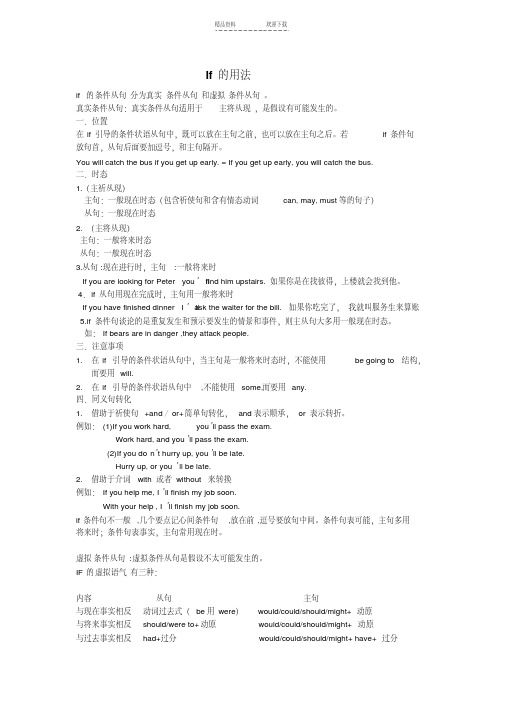
If的用法if 的条件从句分为真实条件从句和虚拟条件从句。
真实条件从句:真实条件从句适用于主将从现,是假设有可能发生的。
一.位置在if 引导的条件状语从句中,既可以放在主句之前,也可以放在主句之后。
若if 条件句放句首,从句后面要加逗号,和主句隔开。
You will catch the bus if you get up early. = If you get up early, you will catch the bus.二.时态1.(主祈从现)主句:一般现在时态(包含祈使句和含有情态动词can, may, must等的句子)从句:一般现在时态2. (主将从现)主句:一般将来时态从句:一般现在时态3.从句:现在进行时,主句:一般将来时If you are looking for Peter you’ll find him upstairs. 如果你是在找彼得,上楼就会找到他。
4.if从句用现在完成时,主句用一般将来时If you have finished dinner I’ll ask the waiter for the bill. 如果你吃完了,我就叫服务生来算账5.if 条件句谈论的是重复发生和预示要发生的情景和事件,则主从句大多用一般现在时态。
如:If bears are in danger ,they attack people.三.注意事项1.在if 引导的条件状语从句中,当主句是一般将来时态时,不能使用be going to 结构,而要用will.2.在if 引导的条件状语从句中,不能使用some,而要用any.四.同义句转化1.借助于祈使句+and∕or+简单句转化,and表示顺承,or表示转折。
例如:(1)If you work hard, you’ll pass the exam.Work hard, and you’ll pass the exam.(2)If you do n’t hurry up, you’ll be late.Hurry up, or you’ll be late.2.借助于介词with或者without 来转换例如:If you help me, I’ll finish my job soon.With your help , I’ll finish my job soon.if 条件句不一般,几个要点记心间条件句,放在前,逗号要放句中间。
英语时态语态完整精编版
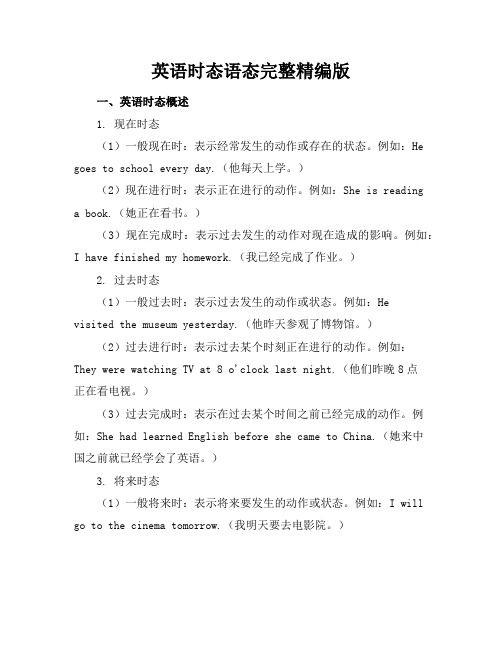
英语时态语态完整精编版一、英语时态概述1. 现在时态(1)一般现在时:表示经常发生的动作或存在的状态。
例如:He goes to school every day.(他每天上学。
)(2)现在进行时:表示正在进行的动作。
例如:She is reading a book.(她正在看书。
)(3)现在完成时:表示过去发生的动作对现在造成的影响。
例如:I have finished my homework.(我已经完成了作业。
)2. 过去时态(1)一般过去时:表示过去发生的动作或状态。
例如:Hevisited the museum yesterday.(他昨天参观了博物馆。
)(2)过去进行时:表示过去某个时刻正在进行的动作。
例如:They were watching TV at 8 o'clock last night.(他们昨晚8点正在看电视。
)(3)过去完成时:表示在过去某个时间之前已经完成的动作。
例如:She had learned English before she came to China.(她来中国之前就已经学会了英语。
)3. 将来时态(1)一般将来时:表示将来要发生的动作或状态。
例如:I will go to the cinema tomorrow.(我明天要去电影院。
)(2)将来进行时:表示将来某个时刻正在进行的动作。
例如:He will be playing football at 4 o'clock this afternoon.(他今天下午4点将正在踢足球。
)(3)将来完成时:表示将来某个时间之前已经完成的动作。
例如:By next year, I will have graduated from college.(到明年,我将已经大学毕业了。
)二、英语语态概述英语语态是用来表达句子主语与谓语动词之间的关系。
英语共有两种语态:主动语态和被动语态。
下面我们将深入了解这两种语态的用法和特点。
一般现在时、一般过去时和一般将来时课件(PPT31张)

8. ---Let’s go to the cinema. There is a good movie.
---Ok. I _A____ you at the school gate at 7 p.m.
1. Long long ago, there ___C_____ four foxes and they lived a happy life together. A. had B. has C. were D. are 2. Could you tell me __C______ a moment ago? A. what were they talking about B. what are they talking about C. what they were talking about D. what they are talking about
e. g. She is going to buy a new bike.
她打算买一辆新的自行车。
1. We will land soon. 2. They will not take off next week. 3. Will he be ready tomorrow? Yes, he will. / No, he won’t.
3. With the development of science and technology, robot cooks __C_______ in our
families in the future.
A. appear
B. appeared
C. will appear D. were appearing
一般现在时,一般过去时,一般将来时及现在进行时
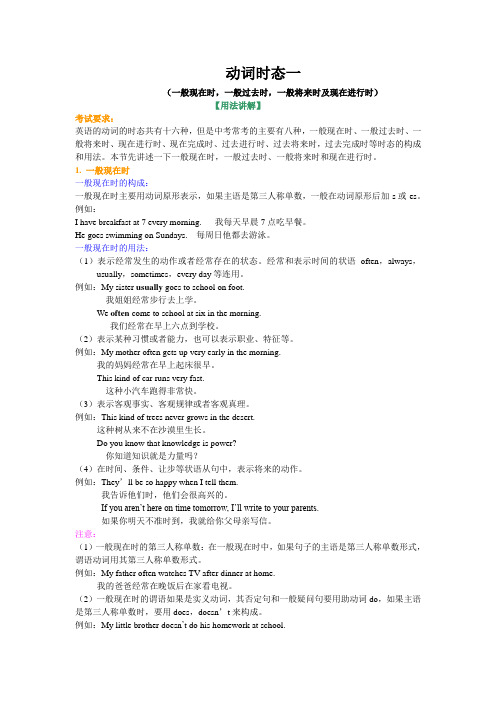
动词时态一(一般现在时,一般过去时,一般将来时及现在进行时)【用法讲解】考试要求:英语的动词的时态共有十六种,但是中考常考的主要有八种,一般现在时、一般过去时、一般将来时、现在进行时、现在完成时、过去进行时、过去将来时,过去完成时等时态的构成和用法。
本节先讲述一下一般现在时,一般过去时、一般将来时和现在进行时。
1. 一般现在时一般现在时的构成:一般现在时主要用动词原形表示,如果主语是第三人称单数,一般在动词原形后加-s或-es。
例如:I have breakfast at 7 every morning. 我每天早晨7点吃早餐。
He goes swimming on Sundays. 每周日他都去游泳。
一般现在时的用法:(1)表示经常发生的动作或者经常存在的状态。
经常和表示时间的状语often,always,usually,sometimes,every day等连用。
例如:My sister usually goes to school on foot.我姐姐经常步行去上学。
We often come to school at six in the morning.我们经常在早上六点到学校。
(2)表示某种习惯或者能力,也可以表示职业、特征等。
例如:My mother often gets up very early in the morning.我的妈妈经常在早上起床很早。
This kind of car runs very fast.这种小汽车跑得非常快。
(3)表示客观事实、客观规律或者客观真理。
例如:This kind of trees never grows in the desert.这种树从来不在沙漠里生长。
Do you know that knowledge is power?你知道知识就是力量吗?(4)在时间、条件、让步等状语从句中,表示将来的动作。
例如:They’ll be so happy when I tell them.我告诉他们时,他们会很高兴的。
初中英语语法:一般现在时、一般过去时和一般将来时
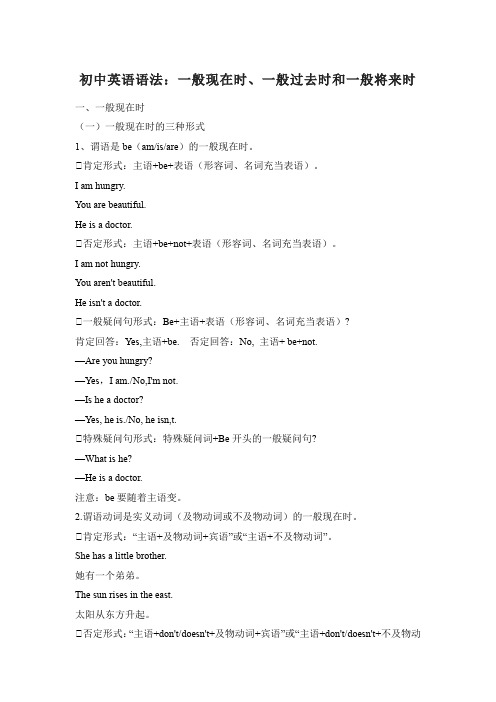
初中英语语法:一般现在时、一般过去时和一般将来时一、一般现在时(一)一般现在时的三种形式1、谓语是be(am/is/are)的一般现在时。
①肯定形式:主语+be+表语(形容词、名词充当表语)。
I am hungry.You are beautiful.He is a doctor.①否定形式:主语+be+not+表语(形容词、名词充当表语)。
I am not hungry.You aren't beautiful.He isn't a doctor.①一般疑问句形式:Be+主语+表语(形容词、名词充当表语)?肯定回答:Yes,主语+be. 否定回答:No, 主语+ be+not.—Are you hungry?—Yes,I am./No,I'm not.—Is he a doctor?—Yes, he is./No, he isn,t.①特殊疑问句形式:特殊疑问词+Be开头的一般疑问句?—What is he?—He is a doctor.注意:be要随着主语变。
2.谓语动词是实义动词(及物动词或不及物动词)的一般现在时。
①肯定形式:“主语+及物动词+宾语”或“主语+不及物动词”。
She has a little brother.她有一个弟弟。
The sun rises in the east.太阳从东方升起。
①否定形式:“主语+don't/doesn't+及物动词+宾语”或“主语+don't/doesn't+不及物动词”。
She doesn't have a little brother.她没有弟弟。
I don't eat every morning.我每天早晨都不吃饭。
①一般疑问句形式:“Do/Does+主语+及物动词原形+宾语”或“Do/Does+主语+不及物动词原形”。
肯定回答:Yes,主语+do/does. 否定回答是:No, 主语+ don't/doesn't.—Do you eat every morning?—Yes, I do./No, I don't.—Does she have a little brother?—Yes, she does./No, she doesn't.①特殊疑问句:特殊疑问词+do/does开头的一般疑问句?What do you like?When do you go to school?注意:根据主语确定用do还是does。
初中英语时态表

初中英语时态表初中英语时态表是学习英语语法的重要工具,它总结了英语中不同时态的基本形式和用法。
以下是初中英语时态表的总结:一、一般现在时(Simple Present Tense)形式:主语 + 动词原形/第三人称单数形式用法:描述经常性、习惯性的动作或状态;描述客观事实或普遍真理;表示主语的特征、性格或能力。
二、一般过去时(Simple Past Tense)形式:主语 + 动词过去式用法:描述过去某个时间发生的动作或状态;描述过去习惯性或经常性的动作;表达过去的经历或经历过的事实。
三、一般将来时(Simple Future Tense)形式:主语 + will/shall + 动词原形用法:描述将来某个时间将要发生的动作或状态;表示意愿、计划或打算。
四、现在进行时(Present Continuous Tense)形式:主语 + be动词(am/is/are)+ 动词-ing形式用法:描述正在进行的动作或状态;表示即将发生的动作;表达感情或态度。
五、过去进行时(Past Continuous Tense)形式:主语 + was/were + 动词-ing形式用法:描述过去某个时间正在进行的动作或状态;表示过去某个时间段的持续动作。
六、将来进行时(Future Continuous Tense)形式:主语 + will be + 动词-ing形式用法:描述将来某个时间正在进行的动作或状态;表示将来某个时间段的持续动作。
七、现在完成时(Present Perfect Tense)形式:主语 + have/has + 过去分词用法:描述过去发生的动作对现在造成的影响或结果;表示从过去某个时间开始一直持续到现在的动作或状态。
八、过去完成时(Past Perfect Tense)形式:主语 + had + 过去分词用法:描述过去某个时间之前已经完成的动作或状态;表示过去某个时间之前的经历或经历过的事实。
(完整word版)主将从现常见的有以下六种情况.docx

常见的有以下六种情况:一、如果主句是将来时或表示将来含义时,那么条件和时间状语从句多用一般现在时如:When I grow up, I will be a nurse and look after patients/ I want to be a nurse and look after patients.我长大后要当一名护士,照顾病人。
二、如果主句是祈使句,那么从句通常要用一般现在时如: Don’t laugh at me when I make a mistake.我犯错误的时候不要笑话我。
三、如果主句是含有情态动词的一般现在时,根据需要从句多用一般现在时如: You should be quiet when you are in the reading room在阅览室时应保持安静。
四、如果if的条件状语从句遇到变换间接和直接时, 祈使句应用not to....如 ; She said not to close the window常见的时间状语从句的连词有:as soon as,when,while ,as,until等五、主将从现说的是在含有时间状语从句和条件状语从句的主从复合句中,如果主句的时态是一般将来时,那么从句要用一般现在时。
例如: I will tell him about it when he comes.If it is fine tomorrow, we will go outing.六、如果主句的时态是过去将来时,那么从句要用一般过去时。
例如:He said that he would have another try if he had the chance.I knew he could help me if he was free the next day.主要标志有:if 、 unless 、 until 、 when 、 as soon as 等If 引导的条件句(if 翻译成 " 如果 " 的时候)Ⅰ .(if从句)主句v./ v. 三单will+v.Ⅱ . if+sb+v./ v. 三单can+v.某事很可能发生,条件是可能存在的,主句中某种情况发生的概率也是很高的。
初中主将从现讲解及练习

什么是主将从现?
主将从现是指在时间状语从句 和条件状语从句中,如果主句 是一般将来时,从句用一般现 在时替代一般将来时。
引导条件状语从句 的词有哪些?
if :If you ask him, he will help you.
unless :I’ll go there tomorrow unless it rains.
A. fail
B. fails
C. will fail D. is failing
( A ) 11. Please tell her the
news when she_____.
OK, I will.
A. comes
B. will come.
C. come
D. would come
D
( ) 12. The students will
引导时间状语从句 的词有哪些?
when , while , before , after , untill , till , since , as soon as ,
主将从现有哪些内容?
1.主将从现 2.主祈从现 3.主情从现
1.主将从现
主句是一般将来时,从句用一 般现在时。 When I grow up, I’ll be a doctor. If you go to the party, you will be happy.
2.主祈从现
主句是祈使句,从句用一般现 在时。 Don’t laugh at me when I make a mistake.
3.主情从现
主句中含有情态动词,从句用 一般现在时。 You should be quiet when you are in the reading room.
【精品】英语语法_一般时(一般现在、一般过去、一般将来)

一般将来时
概念 1.表示将来经常性、习惯性发生的动作或存在的状态。
2.表示将来要发生的动作或状态。(不强调正在进行,仅仅是一般意义上的将 来) 结构 肯定句:主语 + will/shall + 动词原形
例句:I will go fishing after work.下班后我将要去钓鱼。 否定句:主语 + will/shall + not + 动词原形
例句:They won't be free.他们将没有时间。 疑问句:Will/Shall + 主语 + 动词原形
例句:Will he be a boss? 他将成为老板? 其他常见结构
主语 + be + v-ing(非延续动词的现在分词) 例如: be going结构
主语 + be about + 不定式 主语 + be + 不定式 几点说明 1.说明:shall只用于第一人称,will无限制。 2.will结构和be going结构的区别:前者侧重不得不、客观必然性的将要发生, 后者侧重主观意愿的将要发生。 3.be about + 不定式:该结构表示正要去做。 4.be + 不定式:该结构表示按照计划或安排将要做。 5.详细说明be going结构: (1)be going和to不是固定搭配。 (2)be going to这里的to,既可以是不定式的to,也可以是介词to。
一般过去时
概念 1.表示过去经常性、习惯性发生的动作或存在的状态。 2.表示过去发生的动作或状态。(不强调正在进行,仅仅是一般意义上的过去)
结构 状态句型:主语 + was/were + 表语 行为句型:主语 + did + (宾语)
(完整)一般现在时、现在进行时、一般将来时、一般过去时知识点总结,推荐文档

般现在时、一般将来时、一般过去时、现在进行时知识总结般现在时表示经常性或习惯性的动作,常与表示频度的时间状语连用,女口often, usually, always, sometimes, n ever, seldom, every week/day/year/m on th..., once a week, on Sun da y等。
动词用原形。
当主语为第三人称单数时(he, she, it一个人名),动词变为三单形式。
冃疋句否定句一般疑问句特殊疑问句Be动词主语+am/is/are+其它I am a boy. 主语+am/is/are not+其它I amnot a boy.Am/is/are + 主语+其它Are you a boy?Yes, I am.No, I am not.疑问词(where/what/ when/who/why/how)+am/is/are +主语+其它Where are you?行为动词第一人称1、第二人称you、复数主语+动词原形(+其它)。
We playbasketball afterschool everyday.主语+ don't +动词原形(+其它)。
we don'play basketballafter schooleveryday.Do +主语+动词原形+其它?:Do you playbasketball afterschool everyday?Yes, we do. / No, wedon't.疑问词+ do +主语+动词原形+其它?What do you do afterschool everyday?第三人称单数主语+动词三单式(+其它)。
He swims well.主语+doesn' +动词原形(+其它)。
He doesn 'tswim wellDoes +主语+动词原形+其它。
Does he swim well ?Yes, he does. / No,he does n't.疑冋词+ does +主语+动词原形+其它。
- 1、下载文档前请自行甄别文档内容的完整性,平台不提供额外的编辑、内容补充、找答案等附加服务。
- 2、"仅部分预览"的文档,不可在线预览部分如存在完整性等问题,可反馈申请退款(可完整预览的文档不适用该条件!)。
- 3、如文档侵犯您的权益,请联系客服反馈,我们会尽快为您处理(人工客服工作时间:9:00-18:30)。
一般现在时练习题一、写出下列动词的第三人称单数形式1. work__________ read__________ clean__________ write__________2. teach__________ wash__________ guess__________ watch__________3. go__________ do___________ fix__________ carry_________4. study__________ fly__________ cry__________ play__________5. have__________一.动词时态填空:1. We often______(play) in the playground.2. He _____(get) up at six o’clock.3. _____you often ______(brush) your teeth every morning.4. What (do) ______he usually (do)______ after school?5. Danny _____(study) English, Chinese, Maths, Science and Art at school.6. Mike sometimes ________(go) to the park with his sister.7. At eight at night, she __________(watch) TV with his parents.8. ________ Mike________(read) English every day?9. How many lessons _________your classmate________(have) on Monday?10. What time _________his mother_________(do) the housework?二.按要求改句子1. Do you often play football after school? (肯定回答)2. I have many books. (改为否定句)3. Gao Shan’s sister likes playing table tennis (改为否定句)4. She lives in a small town near New York. (改为一般疑问句)5. I watch TV every day. (改为一般疑问句)6. David has got a goal. (改为一般疑问句)7. We have four lessons.(否定句)8. Nancy doesn’t run fast (肯定句)9. My dog runs fast.(否定句和感叹句)六、根据要求完成句子1、这个老人每天早上六点钟起床。
The old man _____ _____ at six o’clock in the morning every day.2、你从哪里来?Where _____ you from? 或Where _____ you _____ from?我从美国来。
I _____ from America. 或I _____ from America.英语一般将来时练习题:( ) 1. There __________ a meeting tomorrow afternoon.A. will be going toB. will going to beC. is going to beD. will go to be( ) 2. Charlie ________ here next month.A. isn’t workingB. doesn’t workingC. isn’t going to workingD. won’t work( ) 3. He ________ very busy this week, he ________ free next week.A. will be; isB. is; isC. will be; will beD. is; will be( ) 4. There ________ a dolphin show in the zoo tomorrow evening.A. wasB. is going to haveC. will haveD. is going to be( ) 5. –________ you ________ free tomorrow?– No. I ________ free the day after tomorrow.A. Are; going to; willB. Are; going to be; willC. Are; going to; will beD. Are; going to be; will be ( ) 6. Mother ________ me a nice present on my next birthday.A. will givesB. will giveC. givesD. give( ) 7. – Shall I buy a cup of tea for you?–________. (不,不要。
)A. No, you won’t.B. No, you aren’t.C. No, please don’t.D. No, please.( ) 8. – Where is the morning paper?– I ________ if for you at once.A. getB. am gettingC. to getD. will get( ) 9. ________ a concert next Saturday?A. There will beB. Will there beC. There can beD. There are( ) 10. If they come, we ________ a meeting.A. haveB. will haveC. hadD. would have( ) 11. He ________ her a beautiful hat on her next birthday.A. givesB. gaveC. will givingD. is going to giving( ) 12. He ________ to us as soon as he gets there.A. writesB. has writtenC. will writeD. wrote( ) 13. He ________ in three days.A. coming backB. came backC. will come backD. is going to coming back( ) 14. If it ________ tomorrow, we’ll go roller-skating.A. isn’t rainB. won’t rainC. doesn’t rainD. doesn’t fine( ) 15. – Will his parents go to see the Terra Cotta Warriors tomorrow?– No, ________ (不去).A. they willn’t.B. they won’t.C. they aren’t.D. they don’t.( ) 16. Who ________ we ________ swimming with tomorrow afternoon?A. will; goB. do; goC. will; goingD. shall; go( ) 17. We ________ the work this way next time.A. doB. will doC. going to doD. will doing( ) 18. Tomorrow he ________ a kite in the open air first, and then ________ boating in the park.A. will fly; will goB. will fly; goesC. is going to fly; will goesD. flies; will go( ) 19. The day after tomorrow they ________ a volleyball match.A. will watchingB. watchesC. is watchingD. is going to watch ( ) 20. There ________ a birthday party this Sunday.A. shall beB. will beC. shall going to beD. will going to be ( ) 21.________ you ________ free next Sunday?A. Will; areB. Will; beC. Do; beD. Are; be( ) 22.He ________ there at ten tomorrow morning.A. willB. isC. will beD. be( ) 23 It ________ the year of the horse next year.A. is going to beB. is going toC. will beD. will is( ) 24 ________ open the window?A. Will you pleaseB. Please will youC. You pleaseD. Do you( ) 25 – Let’s go out to play football, shall we?– OK. I ________.A. will comingB. be going to comeC. comeD. am coming答案:主将从现常见的主将从现的词有as soon as,when,while ,as,until等一、单项选择( ) 1. If you want to learn English well, you must use it as ___ as possible.A. oftenB. longC. manyD. soon( ) 2. ---What will Bill do if he ____in the test?---He will try again.A. failB. failsC. will failD. is failing( ) 3. Please tell her the news when she_____. OK, I will.A. comesB. will come.C. comeD. would come( ) 4. The students will plant trees if it ___ tomorrow.A. didn’t rainB. hasn’t rainedC. won’t rainD. doesn’t rain( ) 5. We__ home if there is no bus. ---Oh, what a pity!A. will walkB. have walkedC. walkedD. walk( ) 6 . If it _____ tomorrow, I’ll go by car.A. rainB. will rainC. rainsD. would rain( ) 7. If Mary _______ next Sunday, we will go boating together.A. will comeB. comesC. shall comeD. should come( ) 8. --- Don’t forget to ask him to write to me.--- I won’t. As soon as he _______, I’ll ask him to write to you.A. will comeB. cameC. comesD. is coming( ) 9. --- _____ the young girl _____ the old man clean his room every day?--- Yes, she does.A. Does; helpB. Has; helpedC. Did; helpD. Do; helps( ) 10. --- What does Linda often do in the evening?--- She often _______ her homework, but on the evening of March 12 she _______ TV.A. does; watchesB. is doing; watchedC. does; watchedD. is doing; was watching二、用动词的正确形式填空1. If I come, I _______________ ( see ) you.2. If it is fine, we________________( go ) for a walk.3. If it rains, they ______________ ( stay ) at home.4. You will spoil it if you ______________ ( not be ) careful.5. We would be very much pleased if you _______________( come ).6. Will you help me if I _______________ ( need ) you.7. They will get wet if it __________________ ( rain ).8. What a pity I haven’t got my car. If I had, I __________________( take ) you to the airport.9. We would answer if we __________________( can ).10. If you eat too much, you __________________( get ) ill.三、请根据给的线索将下列句子补充完整。
